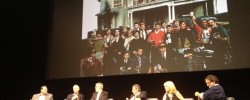
This Week on Demand: 14/07/2013

Another fresh bash of world cinema titles arrives courtesy of Fortissimo Films this week, giving us one of those refreshingly diverse selections of cultural outlooks which make so interestingly varied each new batch of movies. It’s undoubtedly inclined toward the less excellent side of the scale this week, the below titles exceedingly ordinary on the whole, though not—as is always the case—without their little highlights. It’s a while since a week on demand was quite so independent: Hollywood has but one feature for us this time. All the more excuse to try something new.

Back to 1942 (Read our full review)
For a film that deals with the particular trauma through which China and its populace suffered in the midst of the Second World War, Xiaogang Feng’s blockbuster-scale Back to 1942 is a strangely multicultural affair. Largely indebted to the structural mechanics of Hollywood, its large cast also features Adrien Brody and Tim Robbins in supporting roles, the former doing strong albeit unnecessary work, the latter managing barely to maintain his accent. The Chinese actors—chief among them Feng Yuanzheng and Zhang Guoli—largely fare a great deal better, the comparative emotional weight in their stories of families driven apart by famine and all-but abandoned by their government overcoming the movie’s more serious drawbacks. Chief among these is its uncontrolled sprawl: Feng’s script has obvious aims in following this many characters, but they’re more than he can manage to juggle, the lesser doing much to detract from the impact of the more affecting. WORTH WATCHING.

Birds of a Feather
Maybe never, in the dozens of weeks and hundreds of movies this column has encapsulated, has any film been so hopelessly incompetent in every imaginable avenue as the obscenely bad Birds of a Feather. Heinously scripted by director Curtis Franklin and performed by a group of in-name-only actors whose appallingly adolescent sobriquets make entirely unsurprising the production’s atrocious lack of… well, of production, this is an alarmingly stupid vanity project comparable only to a home video hastily shot by a child eager to test out the camera quality of a new smartphone. Nobody in their right mind would ever think to release such a thing; the fact that Birds of a Feather is available for public consumption is indicative of a distributor sorely lacking in sense, and emblematic of the one great drawback of streaming services. Once upon a time anyone could make a movie. Now anyone can get it out there. Caveat inspectoris. UNWATCHABLE.

Buried Secrets
The great power of world cinema is its ability to immerse us in a culture we may be utterly alien toward, to transcend our ignorance and allow us to experience life through another’s eyes. It doesn’t take a great deal of knowledge of Tunisian culture to appreciate the socioeconomic ramifications of Buried Secrets, Raja Amari’s meticulous drama following a trio of women living in the servants’ quarters of a disused mansion, who find their peace interrupted when the estate’s heir arrives with his beautiful new girlfriend. There’s not much to Amari’s script; she prefers to beguile us with the strangeness of these women and the eponymous secrets to which they solemnly refer. It’s not until the final act, a marvellously strange sequence of scenes, that this often demanding, even frustrating approach pays dividends, but oh what dividends they are, and what a curious little movie they make of Buried Secrets, if a decidedly uneven one. WORTH WATCHING.

Charles Bradley: Soul of America (Read our full review)
Perhaps not since Anvil: The Story of Anvil has a music documentary been able to claim a subject whose success the audience so desperately roots for as Charles Bradley: Soul of America. Sixty-two and still earning money on the side as a James Brown tribute act four decades after failing to make it as an artist in his own right, Bradley is introduced to us just on the cusp of his debut album’s release. He is an infectiously charming man, his undiminished enthusiasm for the music after years of rejection making his a story that’s almost unavoidably moving, which makes all the more disappointing the fact that director Poull Brien doesn’t quite manage to make the most of it. His film is less engaging than its subject, the narrative it carves not without its flab, the execution it adopts not without its disappointments. Still, it’s the man that drives the movie, and what an emotional drive it is. RECOMMENDED.

Luster
Would that Luster were any bit as good as its Saul Bass-riffing poster makes it seem. For a while it looks as though it might be, Andrew Howard’s affectingly downbeat performance and Adam Mason’s suitably shady direction indicating an intriguing thriller to come, but it’s not long before things start to turn sour and the film’s foul undercurrent comes to reveal itself. Tracing the mental breakdown of a self-employed man struggling with insomnia and a wife who appears to be having an affair, it boasts an intriguing premise that’s quickly quashed by a largely uninvolving script and eventually destroyed entirely in a disastrously ill-advised ending that calls into question the intentions of Mason and co-writer Simon Boyes. Howard aside, the performances are largely problematic, Tommy Flanagan’s unbridled loudness a particular drawback. This is a strange movie indeed, terribly forgettable in one moment and unforgettably terrible the next. AVOID IT.

My Best Enemy
It’s a strange thing, to wish a Holocaust movie would be funnier, yet that’s precisely the reaction My Best Enemy comes to elicit with its earnest but largely unsuccessful comic efforts. Perhaps it’s not quite right to term it a Holocaust movie: Victor, the son of a Jewish art gallery owner who uses his family’s ownership of a rare Michelangelo drawing as political leverage to free his family of the death camps, escapes the genocide himself, and with it the sense of drama one might expect to accompany this story. He is played by Moritz Bleibtreu, who—alongside Georg Friedrich as the former friend turned Nazi soldier who gives the film its title—does much to enliven a generally dull script, for all its thriller twists. Wolfgang Murnberger directs handsomely enough, but the story is terribly processional, moving with ergonomic intention from start to finish without ever seeming to pause to be at all interesting. SO-SO.
Sandcastle
History permeates the fabric of Sandcastle, the debut feature from Singaporean director Boo Junfeng, and a powerful engagement with the problems of the past. Framed through the story of a quiet young man who, prompted by the death of his grandfather, investigates the life of the father he never knew, it’s a quietly moving piece of work grounded in the revelatory performance of Joshua Tan, a formidable young actor who commands the screen with remarkably little dialogue. Telling us as much about the constitution of his country as of his characters, Junfeng puts his evident talents to excellent use in interweaving an emotional family drama and an enlightening political allegory to one cohesive, conclusive whole. The film’s inability to settle on an appropriate ending sees it overstay its welcome a tad as it draws to a close, but that’s small matter when weighed against the many massive successes that come before. HIGHLY RECOMMENDED.

Son of a Lion
Equally beneficial and bothersome, Australian writer/director Benjamin Gilmour’s outsider perspective of Afghani life in his debut Son of a Lion is integral to the film’s intrigue, if also intensely linked to its greatest failings. Following the motherless son of a weapons manufacturer as he yearns to attempts to convince his father to allow him to go to school, it’s a movie that feels slightly too simple in its setup to really cut to the heart of the issues at hand, yet nonetheless manages with that simplicity to make its points clearly and compassionately. Gilmour makes fine use of the Pakistan locations that double for the film’s setting, though he struggles to elicit from his cast anything more than distractingly amateur performances. In the end, Son of a Lion is something of a noble failure, a fine effort and a commendable one, but one ill-equipped to meet its aims, however admirable they may be. SO-SO.

The Bay (Read our full review)
Just when found footage looked to be the deadest horse ever flogged, along comes the prestige of an Oscar-winning filmmaker to renovate modern horror’s most misused mode. Barry Levinson’s The Bay is a high-point for the faux documentary style, its director’s assured establishment of the world of his film the greatest achievement of his use—not abuse—of found footage. This is not some cynical studio ploy to make a fast buck: no, Levinson employs the tired old style to craft a movie as genuinely creepy as it is alarmingly relevant; the horror here arises from the reality of the scenario as an all-American town is engulfed in the aftermath of an environmental incident. It’s not perfect—far from it—but so rare is the functional found footage film that it’s hard not to dance with delight to see the method so expertly utilised, and for so legitimate a reason. RECOMMENDED.

The Grandfathers
How strange a documentary The Grandfathers is, tracing the journey of Jesse Saint to come to terms with his grandfather’s murder at the hands of an Amazonian tribe by immersing himself in their culture. Director Jim Hanon has found a fascinating story here, and he complements its peculiarities well with a lively visual style employing everything from animation to re-enactments to spice up an otherwise rather staid talking head presentation. At just 56 minutes, it’s a film that can’t help but leave many questions in its midst, which makes it something of a frustrating watch, but its intrigue cannot be denied. Hanon’s inventiveness and trickery within the frame is fascinating, albeit occasionally distracting, the sheer amount of stuff happening onscreen coming to divert attention from the interviewees’ words. On every level this is a mess of a movie, though a consistently engrossing and exceptionally odd one. WORTH WATCHING.

The Hairdresser
There’s no telling what might happen next in The Hairdresser, Doris Dörrie’s beguilingly bizarre tragicomedy trained on the unemployed Kathi, who plots to open a rival salon across from the one that denied her a job for being “unaesthetic”. Happy to be jovially silly at one moment and deathly serious the next, Laila Stieler’s script is an oddity indeed, but one that never fails for a moment to hold the attention with its unforeseen twists and turns. Gabriela Maria Schmeide is a self-deprecating delight as Kathi, managing a consistent slew of physical comedy without ever undermining the dramatic roots of her character. Her role is gloriously reactionary, the baffling directions Dörrie and Stieler elect to take allowing her ample opportunity to look every bit as confused as the audience will surely be. And therein lies the film’s pleasure: like life, The Hairdresser packs a surprise around every corner. Some are pleasant, some are not; all, in their own way, are amusing. RECOMMENDED.
Related Posts
Ronan Doyle
Latest posts by Ronan Doyle (see all)
- TIFF’s TOGA! The Reinvention of American Comedy Review: Airplane! (1980) - August 8, 2013
- Locarno Review: The Dirties (2013) - August 8, 2013
- This Week on Demand: 04/08/02013 - August 7, 2013































